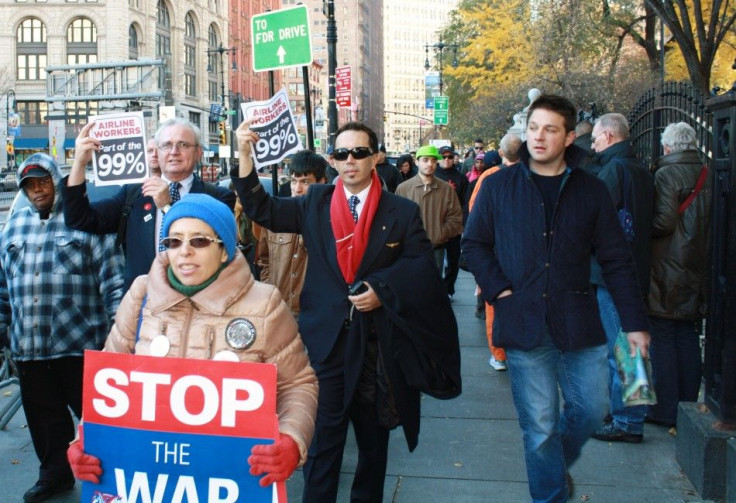Occupy Wall Street Won't End Until Real Change Begins
Opinion

It's the morning after the action, or perhaps the hangover of action, and a question lingers in the air like a dull whiskey headache that lasts past noon.
The quandary facing Occupy Wall Street--and by default the rest of the world: What exactly comes next?
The international Day of Action saw thousands of protesters take to the streets from Spain to Seattle to New York, but now that the big OWS display is over, what's the end game?
Many in the one percent think the movement will simply peter out. We've let them throw their tantrum, now let's get back to the links and the boardroom, they think.
But the movement has grown too large and its adherents too committed for it to just fade away. Whoever is counting on maintaining the status quo may well be on the wrong side of history.
Nothing has changed for the 99 percent--so far. Law enforcement crackdowns have repeatedly emboldened and invigorated the participants, many of whom now have no home other than Zuccotti Park or other encampments across the globe. Is it realistic to assume that all of these varied men and women will put their signs down at once, now that their momentum is clearly building worldwide.
Occupy Wall Street has an office now--and $500,000 in its warchest. Clearly the movement will continue onward, perhaps abating somewhat during the dead of winter, but never really going away.
It's not over at all, no, Paul Benjamin, a 22-year-old protester from Brooklyn, said Friday morning at Zuccotti Park. Not even close.
In fact, it may just be getting started as the world economy is showing few indications of quickly recovering and economic inequality grows.
Case in point: On Friday afternoon, Occupy's endurance showed itself on the streets of New York, as a parade of marchers made their way from Zuccotti Park to Foley Square for another protest with a large contingent of union members.
So the end is not nigh, despite the insomniac prayers of New York City's Mayor Michael Bloomberg, Police Commissioner Ray Kelly and their law-and-order brethren around the globe.
The end of such protests for the world's leaders comes not from desperate, violent raids and jailing the press. Something more substantive is needed to rescue millions of ordinary citizens from the grip of poverty and the despair of idled hands before the movement can rest.
It may arrive in the form of a revolution, either violent or philosophical. Let them eat cake is not working any longer. Economic inequality is dividing us. That's why protesters and elites alike are worried that heads may start to roll, if things don't start getting better soon. Bloodletting has already accompanied the Arab Spring, rooted in similar disparities.
Maybe the protests will end when politicians crack under the pressure and institute substantive economic and social reforms. A justly negotiated redistribution of wealth, a concept turned by wealthy zealots into a dirty word, is what many Occupiers seek, or at least an opportunity.
Or perhaps OWS will develop into a new political force that seizes on the energy and ideas of the protesters and transforms them into real change.
© Copyright IBTimes 2024. All rights reserved.





















